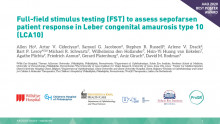Full field stimulus testing (FST) to assess sepofarsen patient response in Leber congenital amaurosis type 10
Published on at AAO
Link DownloadAuthor(s)
Allen Ho1, Artur V Cideciyan2, Samuel G Jacobson2, Stephen R Russell3, Arlene V Drack3, Bart P Leroy4, 5, 6, Michael R Schwartz7, Wilhelmina den Hollander7, Hsin Yi Huang van Eekelen7, Agathe Plichta7, Friedrich Asmus7, Gerard Platenburg7, Aniz Girach7, David M Rodman7
1 Wills Eye Hospital, Thomas Jefferson University, Philadelphia, Pennsylvania, USA; 2 Department of Ophthalmology, Scheie Eye Institute, Perelman School of Medicine, University of Pennsylvania, Philadelphia, Pennsylvania, USA; 3 The University of Iowa Institute for Vision Research, University of Iowa, Iowa, USA; 4 Center for Medical Genetics, Ghent University Hospital, Ghent, Belgium; 5 Department of Ophthalmology, Ghent University and Ghent University Hospital, Ghent, Belgium; 6 Division of Ophthalmology and Center for Cellular Molecular Therapeutics, The Children's Hospital of Philadelphia, Philadelphia, Pennsylvania; 7 ProQR Therapeutics, Leiden, the Netherlands.
Description
In a phase 1b/2 trial, 11 LCA10 patients received intravitreal sepofarsen. The goal was to evaluate patient response to sepofarsen through assessment of visual acuity and full-field stimulus testing (FST). Data show that FST seems a more sensitive method in patients with severely impaired vision.
Recognized with best poster award at AAO 2020.

Related publications
-
Results of a phase 1b/2 trial of intravitreal (IVT) sepofarsen (QR-110) antisense oligonucleotide in Leber congenital amaurosis 10 (LCA10) due to p.Cys998X mutation in the CEP290 gene
Date:
Author(s): Russell SR, Drack AV, et al.
ePoster -
Results of a phase 1b/2 trial of intravitreal (IVT) sepofarsen (QR-110) antisense oligonucleotide in Leber congenital amaurosis 10 (LCA10) due to p.Cys998X mutation in the CEP290 gene
Date:
Author(s): Russell SR, Drack AV, et al.
Presentation -